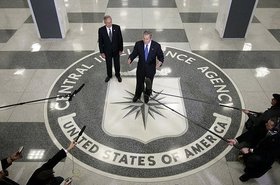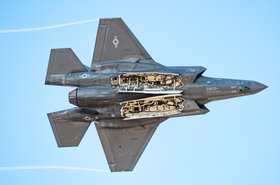With criticism against the DoD's JEDI cloud contract mounting, the Defense Department's CIO has tried to alleviate some concerns and exert control over a narrative that has been increasingly shaped by lobbyists and think tanks.
The contract - which could be worth up to $10bn over 10 years, but will first cover two years - is set to go to either Amazon Web Services or Microsoft Azure, in a single-award deal.
A winner was expected to be announced soon, but after criticism from the President, the new Defense Secretary said that he would conduct a review of the Joint Enterprise Defense Infrastructure program. "No decision will be made on the program until he has completed his examination," a spokesperson said earlier this month.
Paused, but not paused
"So Secretary Esper made a commitment during his confirmation hearing that he would take a look at the overall JEDI program," CIO Dana Deasy said in a briefing with reporters. "People have picked up this word, 'pause.' There is not a pause on the overall JEDI program, meaning that we are still a number of weeks away from completion of the overall evaluation."
He added: "It's a highly-technical evaluation at this point that we are going through with the finals. That still is going to take a number of weeks to complete, so therefore, the continuation of the JEDI evaluation work has not been paused. That work continues on."
Although Secretary Esper said he was conducting an examination of the program, Deasy downplayed the situation. "What is occurring is Secretary Esper has asked to go through a series of sessions to fully comprehend the overall JEDI program," he said.
"We have put together a series of education programs that allow him to get [a] deep understanding."
While the work around JEDI continues, Deasy was asked by Politico if the DoD would award the contract before Esper's review was completed: "No, we will not. Obviously, we'd need to ensure that he is fully-educated. Right now, that hypothetical question is highly doubtful we'll even find ourselves in that situation."
Deasy said that Esper "obviously has a role to weigh into the overall direction of this program," but the CIO did not address what would happen if the Secretary wanted to significantly change that direction, and how that could lead to more substantial delays. "I can't speculate today, nor would it be appropriate for me to try to describe those consequences," he said.
Another factor that could slow the JEDI award is the ongoing investigation by the DoD Inspector General. "Before we take any final decision, we will obviously consult with the I.G. on this. I mean, our role right now is to let the I.G. - you know, they need to be independent. They need to complete their process.
"But if we get to the point where we do not have an I.G. report, before we would issue any final award, we will obviously have a conversation with the I.G. We will consult with them and in having that consultation, decide if there's anything that they're sharing with us that would give us reason to pause before it can continue on with award."
Separate investigations and legal claims into the contract did not find any signs of significant impropriety.
After Oracle brought the DoD and AWS to court over alleged collaboration, Judge Eric G. Bruggink ruled against them and concluded that while there was "a significant amount of communication and negotiation between AWS and DoD employees," and a potential for conflicts of interest which were not adequately disclosed, the contracting office's view that "the errors and omissions were not significant and did not give AWS a competitive advantage was reasonable and well supported."
Looming large over JEDI is the President's take on the cloud procurement program. After an anti-JEDI document crafted by Oracle reached the President's desk, he told reporters: “I’m getting tremendous complaints about the contract with the Pentagon and with Amazon.
"They’re saying it wasn’t competitively bid... Some of the greatest companies in the world are complaining about it, having to do with Amazon and the Department of Defense, and I will be asking them to look at it very closely to see what’s going on."
Trump, a frequent critic of The Washington Post and its owner, Amazon CEO Jeff Bezos, was last year rumored to be considering blocking AWS from JEDI simply to hurt the company. He has also repeatedly shared false information claiming Amazon costs the US Post Office billions - USPS is legally required to not ship at a loss, and Amazon pays the same bulk rate as everyone else.
Deasy said that the President was "not involved in source selection process and not involved in all of these efforts that we are doing with Secretary Esper," and declined to comment on how much control over the contract Trump could have, should he wish to get involved.
Multi-cloud, but mostly one cloud
Deasy also tried to push back against the narrative of JEDI being a single-award, 10 year, $10bn contract. As we reported last year, JEDI's first phase will last two years, at which point it will be reexamined - although critics still attest that by then, the JEDI cloud provider will have an overwhelming advantage over competitors in winning the remaining phases of the contract (three years, followed by another three years, and then two years).
The phased approach, Deasy said, "was done by intentional design, that as we learn how to do this, then we can start to bring in additional cloud providers."
At those break points, the DoD will "scan the marketplace, evaluate new technology offerings. Based on whoever we have, decide if that's the best course to stay with, or to bring in multiple [clouds]" Deasy said.
The CIO hit back at reports that made JEDI sound like it would definitely cost $10bn, rather than up to $10bn. "In no way is this is a $10 billion cloud," Deasy said. "It is technically a $1 million award with a two-year contract with extensions that follow on. That will be complementary to other cloud awards that we will continue to do across the Department of Defense."
A 'fact sheet' shared with reporters added: "JEDI’s total contract ceiling, if all option periods are exercised, is $10 billion, but DoD is under no obligation to place any orders beyond the $1 million minimum. DoD’s Cloud Strategy includes a multi-vendor, multi-cloud ecosystem, which is consistent with industry best practices."
But, while the DoD will continue to use other cloud services, it hopes for JEDI to serve as its main cloud platform, responsible for the majority of its workloads - something that will certainly cost more than $1m.
In the DoD's December 2018 Cloud Strategy document, it states: "The Department will implement a commercial General Purpose enterprise-wide cloud solution, Joint Enterprise Defense Infrastructure (JEDI), for the majority of systems and applications.
"This General Purpose cloud will allow for the Department to take advantage of economies of scale, broadly provide common core services, and ensure information superiority through data aggregation and analysis."
The DoD will shift to a JEDI-first cloud infrastructure, where "only when mission needs cannot be supported by General Purpose will Fit For Purpose alternatives be explored," it notes.
"In such a case, a mission owner will be required to submit for approval an Exception Brief to the Office of the DoD CIO describing the capability and why the General Purpose cloud service does not support their mission."
With this in mind, it is hard to predict how much will be spent on JEDI, but Deasy noted that the department is already spending "well in excess of half a billion dollars annually on a multiple number of clouds inside the Department of Defense." It also aims to consolidate a large number of its 2,500 data centers (with that figure including small server rooms), and shift that primarily to JEDI - so it is unlikely that the cost of the contract will remain around the $1m mark.
Why the military wants JEDI
The press briefing also allowed for the DoD to provide some more insight into what it expects from JEDI, and how it will help "support enhanced lethality and strategic readiness."
Lt. Gen. Jack Shanahan, head of the DoD's Joint Artificial Intelligence Center (JAIC), said: "The warfighter needed enterprise cloud yesterday. Dominance in AI is not a question of software engineering. But instead, it's the result of combining capabilities at multiple levels: Code, data, compute and continuous integration and continuous delivery. All of these require the provisioning of hyperscale commercial cloud."
He continued: "We have spent far too much time, over the past two years, striving to gain access to data for training our algorithms, updating fielded models, site by site, deriving ad-hoc solutions to bring real-world data back to allow dynamic retraining of fielded models, and cobbling together one-off, bespoke cloud solutions to meet mission requirements."
This, Shanahan said, "is not merely an AI issue. It is also about joint all-domain war fighting, taking advantage of emerging technologies to develop new operating concepts for a kind of warfare that will look completely different than what we've experienced for the past 20 years. "
The Department of Defense envisions "a world of algorithmic warfare and autonomy where competitive advantage goes to the side that understands how to harness 5G, AI, enterprise cloud and quantum, when quantum's available, into a viable operational model, all part of the department's transformation from hardware-centric to an all-domain digital force. This modernization is a war-fighting imperative that demands a palpable sense of urgency, and it's one that will be fueled by an enterprise cloud solution."
The aim is to have parts of JEDI spread from the data center to the tactical edge. "Let's say you have the central JEDI cloud, then you have, maybe, portable data centers that are downrange," he said, suggesting they would be the size of a shipping container (like this IBM supercomputer recently purchased by the US Army). "And then all the way down to a two-man portable cloud compute solution that anybody could stay connected to.
"The beauty of that is not only are you getting access to all the benefits of the cloud down to the very edge of the battlefield; as you're collecting data, that data can then go back into that portable cloud, connect to the [shipping container] all the way back to the cloud, so everybody is benefiting from that. And if you get disconnected, as is going to happen in combat, especially in a high-end fight, you still have what you had at the point it was disconnected. When it suddenly comes back, you have all of this now being connected across the entire enterprise."
Of particular concern to Shanahan, as JEDI drags on, is that the United State's potential adversaries are not sitting still.
"We don't want to waste any more time moving forward because we know our potential adversaries are doing it at their own speed," he said. "Whether it's Baidu, Alibaba, Tencent, SenseTime, they're all coming up with their own cloud solutions. Don't get me wrong, I don't want to make them 1,000 feet tall - they're going to have their own cloud interoperability challenges.
"But the level of investment and the number of people they're putting at the problem, they're moving at a very rapid pace and what I can't afford to do is slow down anymore. We want to move equally fast and actually outpace them and they're taking a very similar approach, they know the importance of an enterprise cloud solution to what they're doing with artificial intelligence."
He added that "Russia's not that far behind," but said that their approach is "a little bit different."






